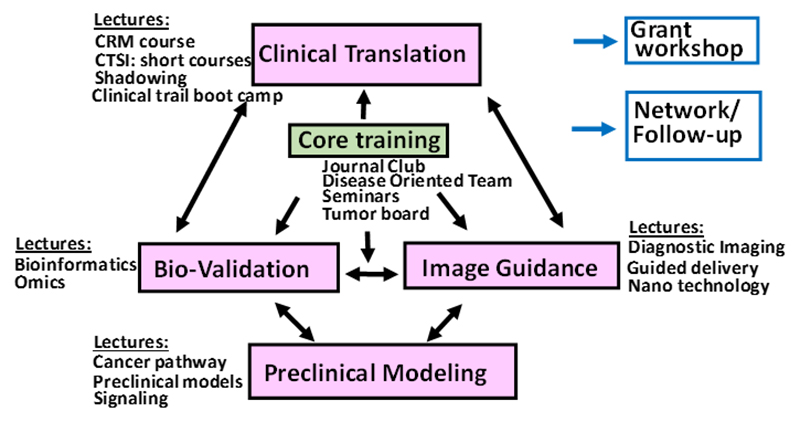Through our training, PhD pre- and postdoctoral trainees will learn to bring basic science knowledge to the bedside, while MD fellows will develop a deeper understanding of hypothesis-driven research. This will increase the pool of future translational researchers.

Training components
The major goal of this training program is to equip the next generation cancer researchers with broad knowledge of both basic and clinical study and ensure that they are capable of bringing bench-top discoveries into clinical trials or bringing clinically important questions back to laboratory study. To accomplish this, our training program emphasizes close working relationship of basic scientists and clinicians as a mentor team to train both PhD and MD trainees, using various innovative training tools as outlined below. Through our training, PhD trainees will learn logistics of truly translational research and understand how to bring their research to bedside, while MD trainees will have deeper understanding of pathological mechanisms behind treatment and bring their clinical questions to bench-top research.
Research Competence Goals
- Translational knowledge
- Translational skills
- Critical thinking
- Science knowledge
- Hypothesis synthesis
- Research design
- Research execution
- Responsible conduct of research
- Data analysis and rigor
- Presentation skills
- Grant/paper writing
- Networking
Training tools
- Course work/lectures
- Four theme rotations
- Mentoring team
- Journal club
- Disease Oriented Team (DOT)
- Seminar/Ground round
- Tumor board
- Clinical and Translational Science Institute short courses
- Clinical conferences
- Grant/paper workshops
- Follow up meeting
Postdocs and Clinical Fellows
Both PhD and MD trainees will receive the two-year training. PhD postdocs will be in the program for two consecutive years. MD fellows will join during their last two years of training. This requires time beyond their three years of clinical fellowship program. To compensate fellows for enrollment and to encourage completion of the training, Wake Forest Baptist Comprehensive Cancer Center provides additional funds to T32 MD fellows (salary supplement and loan debt repayment). In general, MD fellows will spend 80% of their time conducting research and 20% in the clinic.
PhD Graduate Students
Our training program works closely with the Cancer Biology graduate program, which prepares trainees for careers in the cancer research field and closely related areas to meet the ever-growing demand for individuals with such training. The program has a framework designed to provide well-rounded and rigorous training in multiple facets of cancer research, preparing trainees for multiple career tracks. The Cancer Biology graduate program is a part of a larger umbrella track, the Molecular and Cellular Biosciences (MCB) Track. After completion of first year coursework and three research rotations, students select their PhD program of choice and their research advisor.
The coursework required by trainees include lectures on oncogenes, tumor suppressor genes, tumor cell metabolism, cell death mechanism, DNA damage and repair, and other topics. The courses are primarily didactic, providing the foundational knowledge for cancer biology students and T32 trainees. These courses provide the foundation knowledge for our trainees, preparing them for their laboratory training and professional development.
